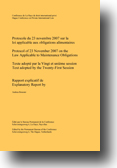Pietro Franzina is associate professor of international law at the University of Ferrara.
By a judgment of 30 July 2013 (available only in French), a Chamber of the European Court of Human Rights found that Switzerland had violated its obligations under Article 8 of the European Convention on Human Rights in a cross-border case concerning the return of a minor and his custody (application No. 33169/10, Polidario v. Switzerland; a press release in English may be found here).
Article 8 of the Convention enshrines the right to respect for private and family life. It provides that there shall be “no interference by a public authority with the exercise of this right except such as is in accordance with the law and is necessary in a democratic society in the interests of national security, public safety or the economic well-being of the country, for the prevention of disorder or crime, for the protection of health or morals, or for the protection of the rights and freedoms of others”.
In 2001, the applicant, Catherine Polidario, a national of the Philippines, had a child with a Lebanese man who had acquired Swiss nationality. A few months later, Ms Polidario, then an illegal immigrant, was ordered to leave the country. She returned to the Philippines with the child. In 2004 she signed an affidavit authorising the father to have his son back in Switzerland. The father did not return his son to the Philippines, although the affidavit made clear that he was to keep the child just “for the holidays”.
Despite the fact that Ms Polidario held custody rights and parental authority in respect of the child, her attempts with the Swiss authorities to obtain his return to the Philippines were unsuccessful (the State of Philippines, by the way, is not a party to the Hague Convention of 25 October 1980 on the Civil Aspects of International Child Abduction).
While proceedings were pending in Switzerland concerning the custody of the child, Ms Polidario asked the Swiss immigration authorities for leave to remain in the country, as a means to exercise her parental rights and to maintain a relationship with her son.
Finally, from 2010, custody of the child was awarded to the father and Ms Polidario was granted access rights which had to be exercised in Switzerland, whereas she had no authorisation to stay in the country.
In its judgment, the Court recalled at the outset that, pursuant to Article 8 of the European Convention, States must not only refrain from interfering with an individual’s private and family life. Positive obligations arise from the said provision along with negative ones, requiring States to adopt measures aimed at ensuring the actual enjoyment of family rights. This implies, inter alia, that the rights relating to the relationship between a parent and his or her child should be determined by the competent authorities on the ground of the legally relevant elements, and not on the ground of the mere fact that a de facto situation has eventually consolidated over time (“et non par le simple écoulement du temps”).
Thus, the Court added, where the custody of a child is disputed, appropriate measures (including those preparatory measures as may be necessary in order to allow a parent and a child to reunite) should be taken rapidly, since the passage of time may entail irreparable consequences for the family relationships at stake. This was particularly true in the circumstances, in view, among other things, of the age of the child, of the fact that the proceedings in respect of return were brought by the applicant while residing in the Philippines and of the limited financial resources available to the applicant herself.
The Court conceded that, starting from 2010, measures had been taken by the Swiss authorities with a view to ensuring the effective exercise of the applicant’s right to entertain regular contacts with the child, although this right – failing an authorisation to reside in Switzerland – had to be exercised by Ms Polidario as an illegal resident, thereby in the absence of a full legal entitlement (“sans bénéficier d’un statut juridique”). The Court further conceded that, in the meanwhile, notably after the procedure in Strasbourg had been initiated, the situation had improved thanks to a temporary permit of stay issued in favour of Ms Polidario.
Yet, according to the Court, the fact remains that the Swiss authorities, by failing to proceed rapidly in respect of the return of the child and his custody and by refusing to issue the applicant with a residence permit, have in fact prevented Ms Polidario to effectively exercise her rights as a parent for six years, i.e. from the time of the abduction of the child, in 2004, until 2010.
In the Court’s view, this amounted to a violation of Article 8 of the Convention.

 The third issue of French Journal du droit international (Clunet) for 2013 was just released. It contains two articles discussing the Brussels I Recast and several casenotes. A full table of content is available
The third issue of French Journal du droit international (Clunet) for 2013 was just released. It contains two articles discussing the Brussels I Recast and several casenotes. A full table of content is available  The last issue of the Revue critique de droit international privé will shortly be released. It contains four articles and several casenotes. A full table of contents is available
The last issue of the Revue critique de droit international privé will shortly be released. It contains four articles and several casenotes. A full table of contents is available